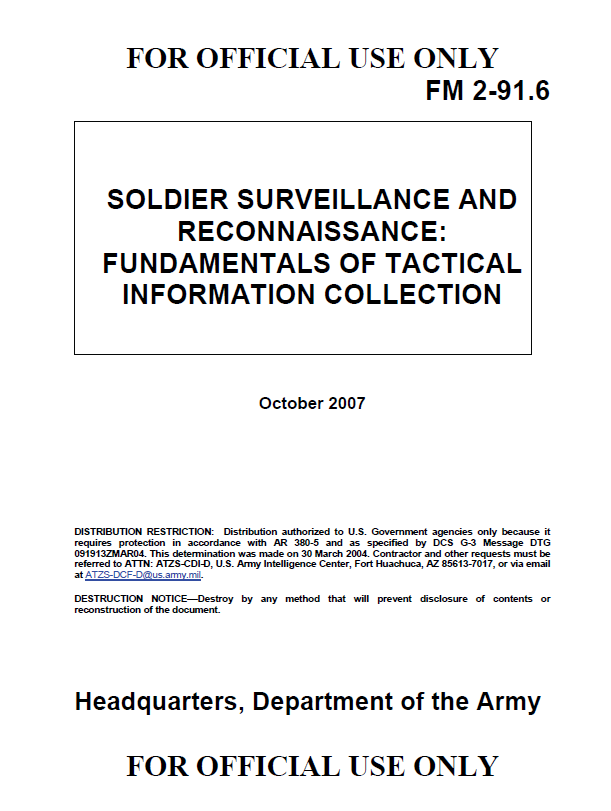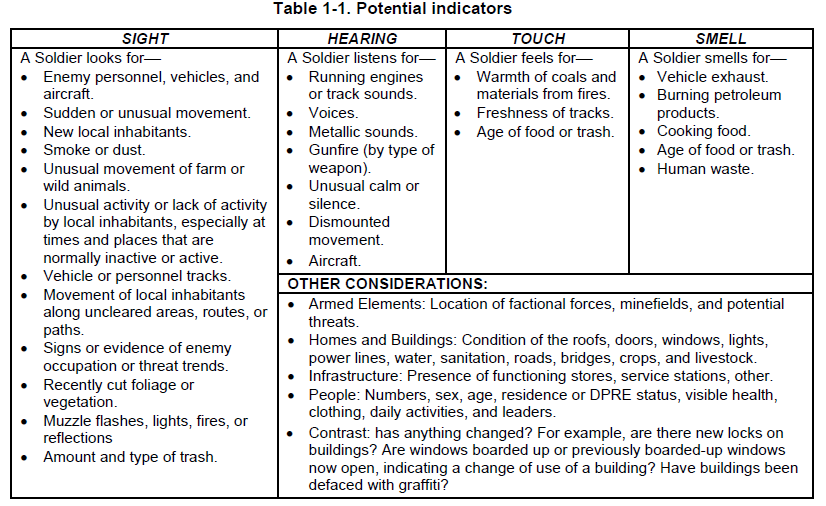The following manual was uploaded to Scribd earlier this month by an unknown individual.
FM 2-91.6 SOLDIER SURVEILLANCE AND RECONNAISSANCE: FUNDAMENTALS OF TACTICAL INFORMATION COLLECTION
- 90 pages
- For Official Use Only
- October 2007
This publication establishes the Army’s doctrine in support of the Every Soldier is a Sensor (ES2) initiative. The need for Soldiers to be aware that basic observations are an important part of operations has led to the development of this manual.
This manual expands on the information contained in ST 2-91.6 and provides a foundation for developing tactical questioning and reporting and supersedes all other tactical questioning handbooks produced by the United States Army Intelligence Center (USAIC), specifically the Tactical Questioning Soldier’s Handbook and ST 2-91.6. This manual––
• Provides the doctrinal framework for Soldiers and leaders at all echelons and forms the foundation for ES2 curricula within the Army Education System. Its audience is broad, from military Soldiers and leaders to civilians. It is essential that all Soldiers and civilians understand how their daily observations feed into the bigger intelligence process and help create a more favorable environment for US success in a region.
• Is a compilation of tools to help all Soldiers collect information through tactical questioning, detainee handling, and document and equipment handling in offensive, defensive, stability operations, and civil support operations.
• Is not intended to make the Soldier an expert on intelligence collection. It is not intended to train Soldiers as intelligence collectors nor authorize Soldiers to conduct interrogation and source operations.
• Introduces the basics of questioning and reporting and provides some tools for patrols and S-2s.
• Applies to the Full Spectrum Operations. Principles outlined are valid under conditions involving use of chemical, biological, radiological, nuclear, and high yield explosives (CBRNE).This manual is a compilation of tools to help all Soldiers collect information through surveillance, reconnaissance, patrolling, interacting with the local populace, tactical site exploitation, tactical questioning and detainee handling, briefing, debriefing, and reporting in offensive, defensive, stability operations, and civil support operations. Most of the text was developed specifically for patrols and to conduct traffic control points (TCPs) or roadblocks, and other missions where Soldiers will interact with the local populace including site exploitation and tactical questioning after a planned or hasty raid. The term “patrol” could reflect a platoon, section, fire team, or other special-purpose group given a mission as listed above.
This manual applies to Active Army, the Army National Guard/Army National Guard of the United States, and the United States Army Reserve unless otherwise stated. Although this is Army doctrine, other services will make necessary adaptations based on each of their organizations and service-specific doctrine.
…
3-35. When conducting tactical questioning, it is imperative that the provisions of the Geneva Conventions (FM 27-10) be followed at all times. When possible, obtain as much information as needed through tactical questioning in order to exploit perishable information (for example, another insurgent operation occurring at the same time, the current location of a known HVT). Personnel talked to are not to be mistreated in any way:
DO NOT––
- Pay money or compensate for information.
- Attempt to force or scare information from noncombatants.
- Attempt to recruit or task someone to go seek out information.
- Issue government equipment or identification in exchange for information.
- Refer to personnel questioned as “sources.”
- Establish a “source network.”
- Ask questions of noncombatants in an area where the questioning puts the noncombatant in danger. Be discreet, but not so discreet that you attract attention.
- Ask questions that make your unit’s mission or information requirements obvious.
- Take notes in front of the person after asking the question.
- Ask leading questions. Leading questions are phrased in a way to invoke a particular answer, not simply a yes or no answer. Leading questions allow the individual to answer with a response he or she thinks you want to hear, not necessarily the facts. For example, “Is Group XYZ responsible?”
- Ask negative questions. Negative questions are questions that contain a negative word in the question itself such as “Didn’t you go to the warehouse?”
- Ask compound questions. Compound questions consist of two questions asked at the same time; for example, “Where were you going after work and who were you to meet there?”
- Ask vague questions. Vague questions do not have enough information for the person to understand exactly what you are asking. They may be incomplete, general, or otherwise nonspecific and create doubt in the person’s mind.
- Mention that they may be interrogated later or try any other “scare tactic.”
- Give comfort items to EPWs/detainees. . . they are not your guests.
- Inform them of their rights; someone else will handle that task.
DO—
- Ask only basic questions as described in this section.
- Move detainees to a detention facility as quickly as possible.
…
INTERVIEW PREPARATION
B-25. Soldiers should cover the following in preparing for interviews:
- Select an appropriate site for interviews. Position and arrange the physical setup of the area. When conducting interviews with important people or individuals from different cultures, this arrangement can be significant.
- Instruct interpreters to mirror the Soldier’s tone and personality of speech. Instruct interpreters not to interject their own questions or personality. Also instruct interpreters to inform them if they notice any inconsistencies or peculiarities from those being interviewed.
- When possible, identify cultural restrictions before interviewing, instructing, or conferring with particular foreign nationals. For instance, Soldiers should know when is it proper to stand, sit, or cross one’s legs. Gestures, being learned behavior, vary from culture to culture. Interpreters should be able to relate a number of these cultural restrictions, which, whenever possible, should be observed in working with particular groups or individuals.
- Rehearse with the interpreter using maps, key words or phrases, diagrams, or models that may facilitate a discussion. The interpreter may be able to explain to the Soldier the significance of symbols or gestures commonly used in a conversation to emphasize a point that may not be verbalized.
CONDUCTING AN INTERVIEW
B-26. Soldiers should cover the following when conducting an interview or presenting a lesson:
- Avoid simultaneous translations; that is, both the Soldier and the interpreter talking at the same time. This can be disrupting unless the Soldier and interpreter work very well together.
- Speak for a minute or less in a neutral, relaxed manner, directly to the individual or audience. The interpreter should watch the Soldier carefully and, during the translation, mimic the Soldier’s body language as well as interpret his or her verbal meaning. Observe interpreters closely to detect any inconsistencies between an interpreter’s and a Soldier’s manners. Be careful not to force an interpreter into a literal translation by being too brief. Present one major thought in its entirety and allow the interpreter to reconstruct it in his language and culture.
- Although interpreters perform some editing as a function of the interpreting process, it is imperative that they transmit the exact meaning without additions or deletions. Insist that interpreters always ask for clarification, prior to interpreting, whenever they are not absolutely certain of the Soldier’s meaning. However, be aware that a good interpreter, especially one who is local, can be invaluable in translating subtleties and hidden meanings.
- During an interview or lesson, if questions are asked, interpreters should immediately relay them for an answer. Interpreters should never attempt to answer questions even though they may know the correct answer. Additionally, neither Soldiers nor interpreters should correct each other in front of an interviewee or class; all differences should be settled away from the subject or audience.
- Just as establishing rapport with the interpreter is vitally important, establishing rapport with interview subjects or the target audience is equally important. Soldiers and interpreters should concentrate on rapport. To establish rapport, subjects or audiences should be treated as mature, important human beings who are capable and worthy.


